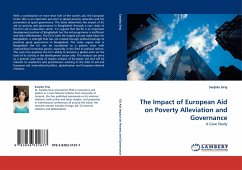
Foreign Aid and Its Effect on Democracy
The Aid Regime and the Public Outcry for Freedom in Post-1991 Ethiopia
Versandkostenfrei!
Versandfertig in 6-10 Tagen
36,99 €
inkl. MwSt.

PAYBACK Punkte
18 °P sammeln!
Historically, Ethiopia has been receiving development assistance in its various forms. Thus, it goes without saying that humanitarian assistance has been crucial for the country mainly due to its recurring tragedies, including drought, famine, poverty, and civil wars. This book has concisely summarized the historical account, theoretical picture, and basic rationales for the aid regime and most importantly it draws attention to the role of democracy assistance in democratization processes in post-1991 Ethiopia. Since there is inadequate literature on the subject, the book endeavors to fill the...
Historically, Ethiopia has been receiving development assistance in its various forms. Thus, it goes without saying that humanitarian assistance has been crucial for the country mainly due to its recurring tragedies, including drought, famine, poverty, and civil wars. This book has concisely summarized the historical account, theoretical picture, and basic rationales for the aid regime and most importantly it draws attention to the role of democracy assistance in democratization processes in post-1991 Ethiopia. Since there is inadequate literature on the subject, the book endeavors to fill the gaps by systematically discussing and analyzing issues on the subject in a more comprehensive way. The argument of the book is that the contribution of democracy assistance in democratizing the post-1991 Ethiopian state and society has been trifling. However, the processes and outcomes of external assistance were and are still saddled with issues of sovereignty, ideology, political power, national interest, and geopolitics. Policy makers, academicians, researchers, and students may find the analyses and explorations made in the book relevant while dealing with the subject












